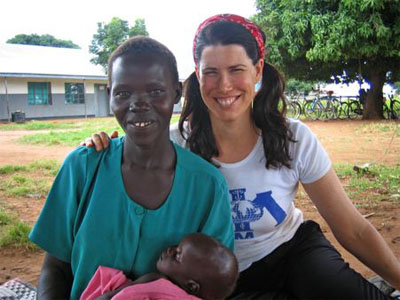March 8 marks the 100th anniversary of International Women’s Day. To commemorate the achievements and ongoing challenges women face in some of the world’s most devastating conflicts, Enough is publishing profiles each day this week of women doing exceptional work to end atrocities and support survivors in Congo, Sudan, and LRA-affected territory.

Melissa Fitzgerald has held roles for the theater, film, and television. In this profile, Fitzgerald explains how her passion for acting and for community service came together when she first visited northern Uganda, sparking a lasting commitment to raise the profile of the devastating effects of the Lord’s Resistance Army on communities across central Africa. Most recently Fitzgerald produced and served as co-artistic director for "Staging Hope: Acts of Peace in Northern Uganda," a film about the collaboration between a group of U.S. actors and Ugandan teenagers in creating a theater program.
“I am an actor and an activist. I like to call myself an ‘actorvist.’ The common thread? Act. To act is to do. It is not to sit around and wait for the spirit to move you to do something or to hope someone else does it. It is not to wait for the perfect time to do it. It is not to wait until you enough money to do it. It is not to say you don’t have enough to offer to do it. It is simply to do it. I think this is as true about life as it is about acting.
“So in 2006, after I learned about the brutal rebel war in northern Uganda from International Medical Corps, I knew I had to do something—to act. So a few weeks after we wrapped the final episode of the West Wing, I was on a plane to northern Uganda to volunteer with IMC.
“That summer, I was allowed to join a field team working with malnourished children and their mothers in camps for internally displaced persons. The mostly Ugandan field team welcomed me with open arms, especially a wonderful woman, let’s call her Josephine. She was kind and patient despite what fate had dealt her. Her father died of malaria; her sister and brother-in-law were killed by the LRA, leaving three sons who Josephine now cares for. Her brother was abducted twice by the LRA. Both times they captured him for over a year before he was able to escape. The second time he escaped, Josephine told me he was so abused and malnourished when he got home that he almost died. He is unable to work or do anything, so in addition to caring for her sister’s three sons, she has also cared for her brother.
“Josephine and I worked closely together every day for several weeks. We were the same age, and although the circumstances of our lives were completely different, the things we hoped for, the love we had for our friends and families, seemed much bigger, deeper, and more significant. I couldn’t help feeling that the only difference between Josephine and me was that I had the good fortune to have been born in the United States to a family that was able to care for me, educated me, and support me, whereas Josephine was born in northern Uganda and her life was torn apart by war.
“I had done nothing to earn this; it was luck, the luck of birth. I won the lottery, and I didn’t even have to buy a ticket. I have been given so much, and with that comes an obligation to share some of that with others.
“In 2007, I went back to northern Uganda with my friend and producing partner, Katy Fox, and a small group of actors, writers, and filmmakers. We went to work with fourteen teenagers living in a displaced persons camp on a theater program and documentary film. We collaborated with the teens to turn their personal stories into dramatic plays about HIV/AIDS, peacebuilding, and reconciliation. These plays gave the teens the opportunity to share their voices and stories with over a thousand of their friends and neighbors in their camp. We returned home with documentary film footage from the program, dramatic monologues based on interviews with war-affected northern Ugandans, and a strong commitment to help resolve the desperate situation facing its people.
“Recently, I received a letter from one of the young men who participated in Voices of Uganda, and in it he wrote, ‘The USA is the signal of freedom and equality of all humanity. I can’t imagine anything more noble than that.’ Please join us in making sure he is right.”
Other profiles in this International Women’s Day series: Lynn Nottage, Chouchou Namegabe
The profiles highlighted in this series were compiled for The Enough Moment, a book by John Prendergast and Don Cheadle about engaged citizens – known and unknown, in the U.S. and abroad – who are mobilizing to help end genocide, rape, and the use of child soldiers in Africa. Visit the Enough Moment Wall to hear people describe their “Enough moment” and to upload a video, photo, or written testimonial of your own

